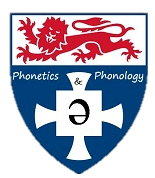-
News:
Accent Articulation Conference First Language Acquisition gamification Group focuses Job Laboratory Phonology Lecturer Linguistics Morphology Perception PhD Funding Phonetics Phonetics and Phonology Phonology Professor Project on Tyneside English Psycholinguistics R Research associate science open day Sociolinguistics Sociophonetics Speech Signal Analysis Speech signal processing statistics Workshop
Monthly Archives: June 2021
Job: Lecturer in Phonetics and Phonology
Newcastle University’s School of English Literature, Language and Linguistics is looking to appoint a full-time lecturer in Phonetics and Phonology. For current researchers in this area at the university you can see the Phonetics & Phonology research groups people page. More Information Full job … Continue reading
R Workshop on Speech Signal Analysis: Dr Chris Carignan #SpeechSignalR
updated 12 July 2021 We are very happy to announce that Dr Chris Carignan will be leading a workshop on speech signal analysis in R. The workshop will take place remotely via Zoom on 13th and 14th July 2021. Please … Continue reading

